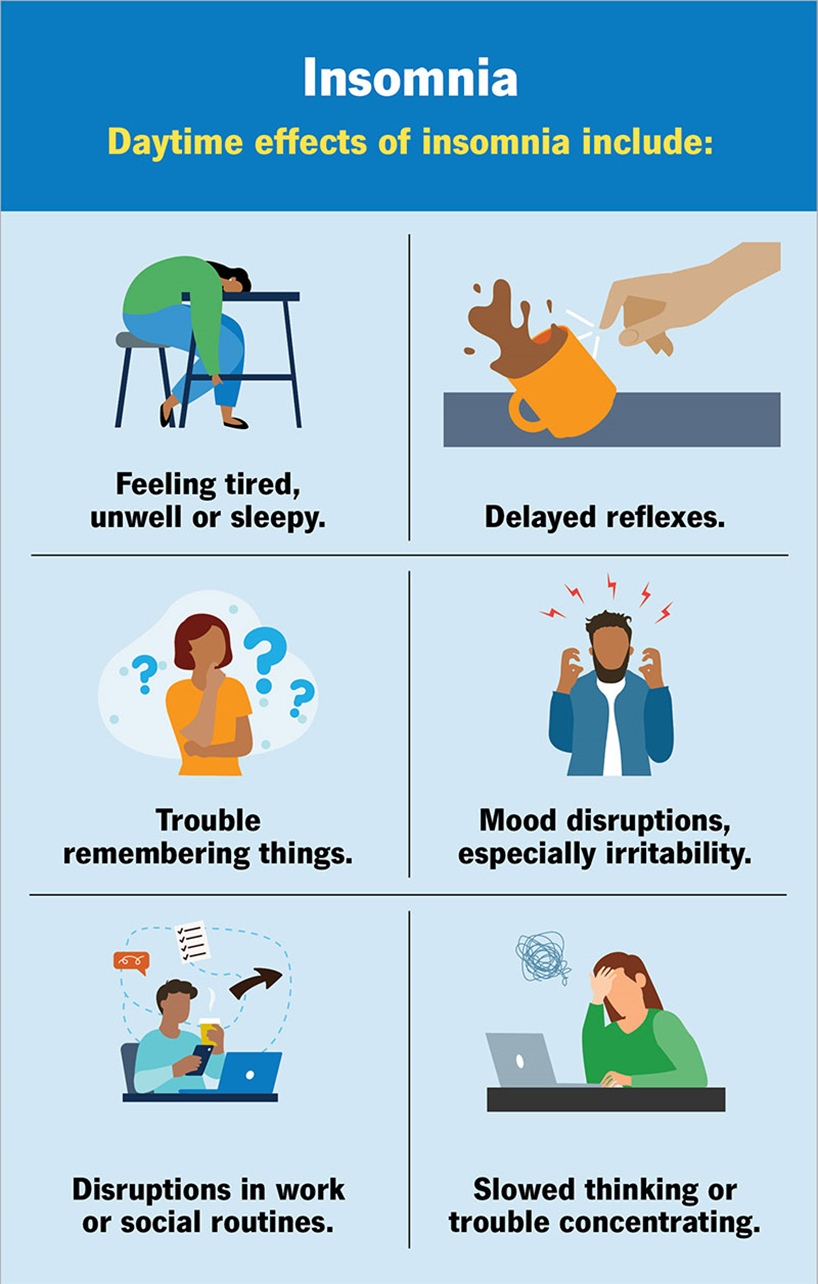A nurse is assessing a client who has chronic insomnia. Which question would address the highest safety priority for the client?
When did you begin to have trouble sleeping?
Are there any specific factors that you think are affecting your ability to sleep?
Do you have difficulty staying awake when you are driving?
Can you describe your bedtime routine to me?
The Correct Answer is C
Choice A Reason:
Asking “When did you begin to have trouble sleeping?” is important for understanding the onset and duration of the client’s insomnia. However, it does not directly address immediate safety concerns. Chronic insomnia can lead to significant daytime impairment, but the question about the onset of sleep troubles does not identify specific safety risks.
Choice B Reason:
Inquiring about specific factors affecting the client’s ability to sleep can help identify potential causes of insomnia, such as stress, environmental factors, or medical conditions. While this information is valuable for treatment planning, it does not directly address immediate safety concerns.
Choice C Reason:
Asking “Do you have difficulty staying awake when you are driving?” addresses the highest safety priority. Chronic insomnia can lead to excessive daytime sleepiness, which significantly increases the risk of accidents, especially while driving. Identifying whether the client is at risk of falling asleep during potentially dangerous activities is crucial for immediate safety.

Choice D Reason:
Understanding the client’s bedtime routine can provide insights into their sleep hygiene and habits, which are important for managing insomnia. However, this question does not directly address immediate safety concerns related to daytime functioning and the risk of accidents.
Nursing Test Bank
Naxlex Comprehensive Predictor Exams
Related Questions
Correct Answer is B
Explanation
Choice A Reason:
Ask close-ended questions is incorrect. Close-ended questions typically elicit short, specific responses such as “yes” or “no.” While they can be useful in certain situations, they do not provide enough information to thoroughly assess a client’s mental status. Open-ended questions allow the client to express themselves more fully, providing the nurse with better insight into their cognitive function.
Choice B Reason:
Ask open-ended questions is correct. Open-ended questions encourage the client to elaborate on their thoughts and feelings, which can reveal more about their mental status. This type of questioning helps the nurse assess the client’s orientation, memory, and thought processes more effectively.
Choice C Reason:
Use directive questions is incorrect. Directive questions are more structured and guide the client towards specific answers. While they can be useful for obtaining specific information, they do not allow for a comprehensive assessment of the client’s mental status.
Choice D Reason:
Use reflective questions is incorrect. Reflective questions are used to encourage the client to think more deeply about their responses and feelings. While they can be helpful in therapeutic settings, they are not the most effective for an initial assessment of mental status.
Correct Answer is A
Explanation
Choice A Reason:
Age dose of pain medication refers to adjusting the dosage of pain medication based on the client’s age. Elderly clients often have different pharmacokinetics and pharmacodynamics compared to younger individuals, which means they may require lower doses of medication to achieve the same effect. This adjustment helps to prevent overmedication and potential side effects, ensuring safe and effective pain management for elderly clients.
Choice B Reason:
Correct method of administering your own pain medication is important for clients who are capable of self-administering their medication. However, this choice does not directly address the issue of balance deficit and the need for an assistive device. While proper medication administration is crucial, it is not the primary concern in this scenario.
Choice C Reason:
Operator can push the PCA button for you if you are asleep is not an appropriate practice. Patient-controlled analgesia (PCA) is designed to allow clients to self-administer pain medication as needed. Allowing someone else to push the button can lead to overmedication and potential complications. This choice does not address the need for an assistive device for balance deficit.
Choice D Reason:
The pain medication is delivered at your nose is not a standard method of pain medication administration. This choice is incorrect and does not relate to the client’s need for an assistive device for balance deficit. Pain medication is typically administered orally, intravenously, or through other appropriate routes, but not through the nose.
Whether you are a student looking to ace your exams or a practicing nurse seeking to enhance your expertise , our nursing education contents will empower you with the confidence and competence to make a difference in the lives of patients and become a respected leader in the healthcare field.
Visit Naxlex, invest in your future and unlock endless possibilities with our unparalleled nursing education contents today
Report Wrong Answer on the Current Question
Do you disagree with the answer? If yes, what is your expected answer? Explain.
Kindly be descriptive with the issue you are facing.
